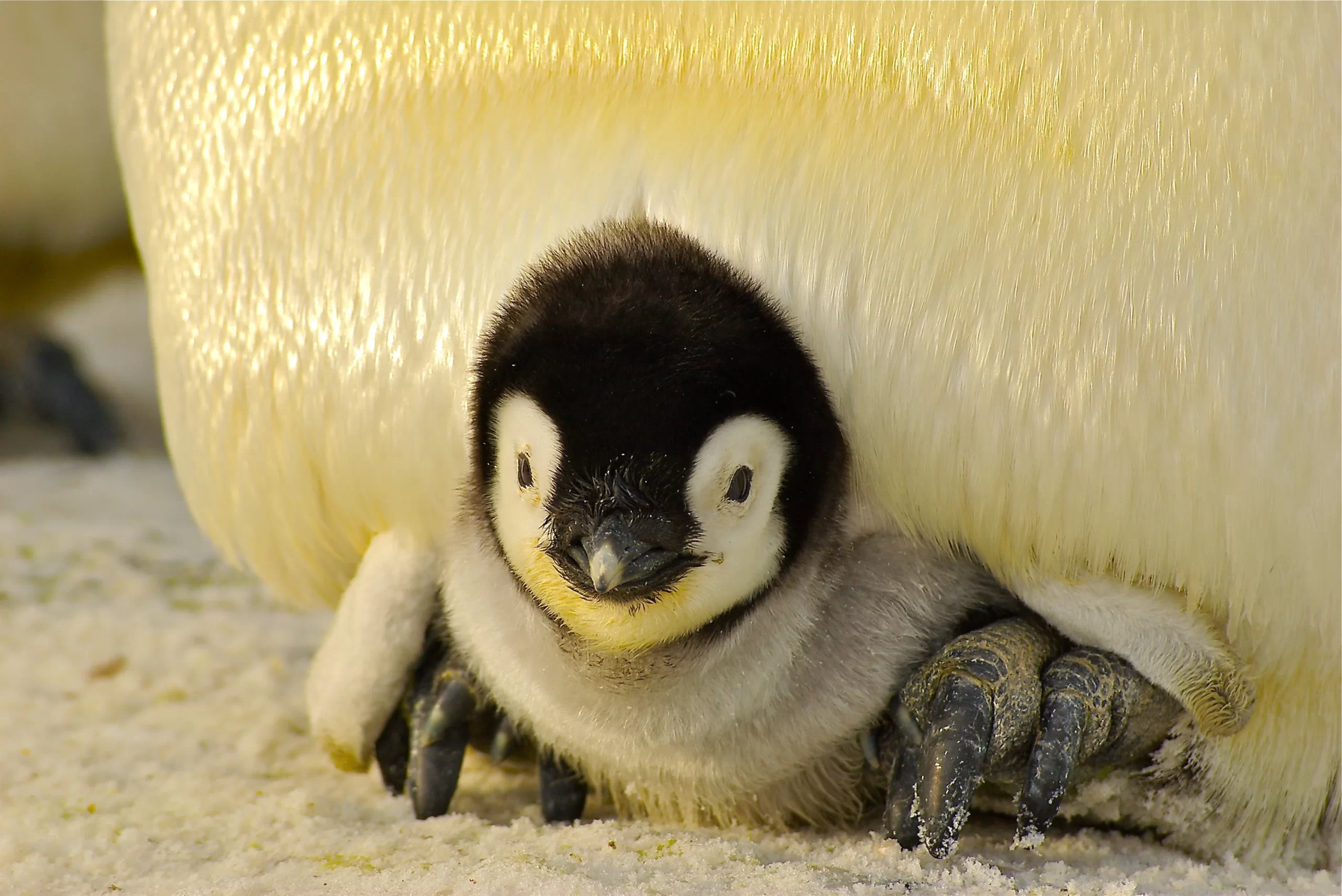Many people are aware of the strange characteristics of penguins. These black and white birds cannot fly, instead being powerful swimmers that are adept at navigating oceans. Given the bizarre features of these birds, some would not be surprised if they didn’t lay eggs.
The first thing that those interested in penguin reproduction should know is whether or not these flightless birds lay eggs or give birth to live young. Considering that few people live among penguins, not many know the answer to this question based on firsthand experience. So, how do penguins reproduce – do penguins lay eggs or give birth?
Though penguins have many traits that are atypical for birds, they haven’t managed to break the link between bird and egg. Penguins, like every other bird species, lay eggs rather than give birth to live young.
Table of Contents
Okay, penguins laying eggs won’t shock a lot of people, so let’s learn about the timing of penguin reproduction. When do penguins lay eggs?

When Do Penguins Lay Eggs?
Considering that there are 18 unique species of penguin, the time in which penguins lay eggs is highly variable. The breeding season of these birds will depend on the species and location in which they live.
In addition to location being a factor that dictates when eggs can be laid, the size of a penguin species also influences when eggs are born. Penguins run the gamut in terms of size. Birds like Emperor and King Penguins are large, while species like Little Penguins are petite. Small penguin species can lay eggs more frequently than large penguin species.
Penguin species like Emperor Penguins that live in the Antarctic choose to lay eggs during the coldest time of year so that chicks can hatch as the weather is beginning to warm. For species like the Galapagos Penguin and African Penguin, egg-laying timing is not as much of an issue since the weather where they live tends to be warm most of the time.
Do Male Penguins Lay Eggs?
There are some who believe that male penguins have the capacity to lay eggs since some penguins form a pair bond with an individual of their same sex. Considering this, do male penguins lay eggs?
No, male penguins cannot lay eggs. Egg-laying is a trait that is solely possessed by female birds, as male birds simply aren’t equipped with the necessary reproductive organs for egg development.
When Do Penguins Lay Eggs?
Considering that there are 18 unique species of penguin, the time in which penguins lay eggs is highly variable. The breeding season of these birds will depend on the species and location in which they live. However, egg-laying for all species will commence soon after penguin mating.
In addition to location being a factor that dictates when penguin eggs can be laid, the size of a penguin species also influences when eggs are born. Penguins run the gamut in terms of size. Birds like Emperor and King Penguins are large, while species like Little Penguins are petite. Small penguin species can lay eggs more frequently than large penguin species.
Penguin species like Emperor Penguins that live in the Antarctic choose to lay eggs during the coldest time of year so that chicks can hatch as the weather is beginning to warm. For species like the Galapagos Penguin and African Penguin, egg-laying timing is not as much of an issue since the weather where they live tends to be warm most of the time.
What Does A Penguin Nest Look Like?
Unlike some bird species that construct remarkably intricate nests, penguins put very minimal effort into their nests. Some penguins scarcely build nests at all, instead laying their eggs directly onto the ground.
The penguins that do attempt to create a nest do no more than make a swallow indentation in the ground before lining it with a few feathers or pebbles.
Where Do Penguins Lay Their Eggs?
Alright, so we’ve discussed a bit about penguin reproduction, but where do penguins lay their eggs? Well, the location in which a penguin lays its eggs will depend on the species. Here are the different nesting habits of penguins:

Rookeries
Penguin fans have undoubtedly seen footage of large congregations of penguins nesting at rookeries to raise their young. Penguin pairs stake out nesting spots within a rookery where they either scrape out an indentation within the ground for a nest or lay eggs on rocks.
Rookeries are an impressive sight, as they potentially support thousands of penguins during the breeding season. However, not all penguin species nest in rookeries.
Burrows
As strange as it sounds, penguin reproduction takes place underground in burrows for several species. This practice is most common in penguins that inhabit New Zealand and surrounding islands. Moreover, species like Magellanic Penguins in Argentina nest in burrows.
Penguins are not capable of excavating their own burrows. These birds lack the proper adaptations and muscle power to do so.
Instead, they rely on other species to dig the burrows, only taking up refuge once they’re abandoned. The advantage of nesting in burrows is that penguins can seek refuge from certain predator species. Wow, so do penguins lay eggs underground?
Indeed! Species such as Little Penguins and Fiordland Penguins readily breed in burrows. Although burrows would seemingly be a safe place to lay eggs, studies have shown that these locations are prone to attacks from crows and ravens.
Now that we know more about where penguins lay their eggs, it’s time to discuss the number of penguin eggs that can be laid. So, how many eggs do penguins lay?
How Many Eggs Do Penguins Lay?
You may wonder if penguins laying eggs is a similar process to that of geese. Do penguins lay eggs in comparable numbers to waterfowl?
No, penguins do not lay large clutches of eggs as some other bird species do. For instance, penguins certainly won’t lay a dozen eggs like some waterfowl. So, how many eggs do penguins lay?
Well, Little Penguins and African Penguins have the greatest egg-laying capacity for penguins, laying up to three eggs in a clutch. How many eggs does a penguin lay if it isn’t one of these two species?
Well, medium-sized Penguins like Adelie, Chinstrap, and Gentoo Penguins tend to lay one to two eggs per clutch, while large species like King and Emperor Penguins lay a single egg per clutch.

How Often Do Penguins Lay Eggs?
Now that you know more about penguin reproduction, you may wonder about penguin egg-laying frequency. So, how often do penguins lay eggs? Can penguins lay eggs multiple times per year?
Well, the action of penguins laying eggs doesn’t occur more than once per year for large penguins, as the commitment to raising their first clutch of chicks is too time-intensive. However, small species of Penguins can breed multiple times per year.
Little Penguins and other penguins on the small end of the spectrum have the potential to raise multiple clutches of eggs given that they can raise young much faster compared to large penguin species.
Penguin Egg Size
As you may expect, penguin eggs can be quite variable depending on the species that laid the eggs following penguin reproduction. The eggs of Little Penguins may only be a couple of inches in length, while the eggs of Emperor Penguins may be close to 5 inches long.
Penguin Egg Incubation Duration
Penguin egg incubation varies significantly by species. You see, smaller penguin species do not need to incubate their eggs as long as large penguin species like Emperor and King Penguins. It takes a Gentoo Penguin just over a month to incubate its eggs, while penguin egg incubation may take twice as long for Emperor Penguins.
Parental Role In Raising Young
It is commonplace in many birds for one of the parents—typically the male—to do no work in raising the young. However, this is not the case with penguins, as both males and females participate in raising the young.
All male and female penguins split egg incubation duties (save for Emperor Penguins). This allows the other parent to take a break from incubation and forage at sea while they rely on the other to take care of the egg.
When penguins eggs hatch, both parents aid the chicks in their growth. One parent may go out to sea and forage for food for their chicks, while the other may stay behind and protect the chicks. Although often mild-mannered, penguins can be aggressive in their defense of chicks and territory.

How Do Penguin Eggs Survive The Antarctic Cold?
Whenever most of us picture a penguin, we usually visualize a bird battling the frigid conditions of Antarctica. Though most penguins live elsewhere, we still may wonder how species that do live in Antarctica keep their eggs warm.
Only a few penguin species breed in Antarctica, with the Emperor Penguin being the best known. So, how do penguins give birth in these conditions? Do penguins lay eggs during the warmest times of the year at least?
Well, Emperor Penguins produce a single egg, and it is the males who do most of the incubation. Moreover, these eggs are typically laid during the coldest times of the year! Okay, so do male penguins lay eggs if they are the primary caretakers of the eggs?
No, male penguins do not lay eggs. Instead, Emperor Penguin mothers lay the egg and transfer it to the male before leaving to fish out at sea for a few months. Males hold the eggs on their feet and tuck them under a flap of skin near their belly. They keep eggs warm in this position for several months while the young develop within. Remember, birds are warm-blooded, so this allows penguins to endure the brutal Antarctic weather.
The female Emperor Penguins forage at sea while the males incubate the eggs. The males rely on fat reserves to get themselves and their eggs through the freezing winter.

